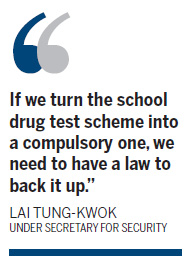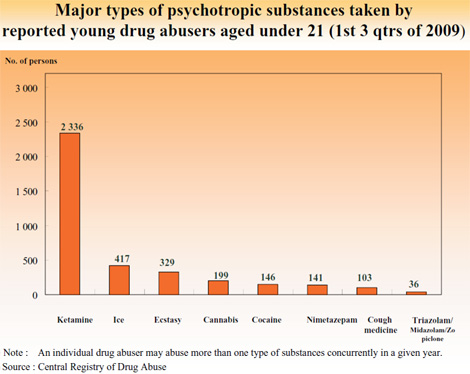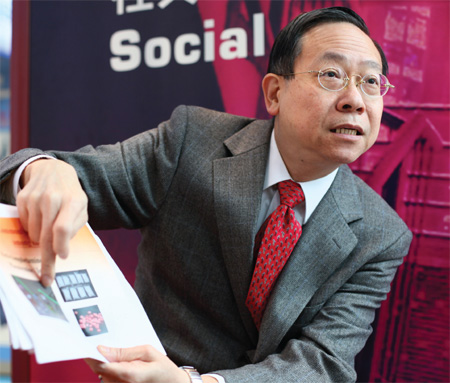Drug-free campus dream
Updated: 2010-03-05 07:35
By Joseph Li(HK Edition)
|
|||||||||
|
Under Secretary Lai Tung-kwok highlights ice, one of the commonly abused drugs among the young people in Hong Kong (above). He also points out that over 90 percent of the local young people are fond of ketamine, a trendy kind of psychotropic substance in pill and powder forms because they think it is unharmful, and it is also very convenient and clandestine to smell the ketamine powder with their noses almost everywhere. |
In Hong Kong, the drug abuse problem among young people, especially students, is very serious. The number of addicted students is on the increase, while the age of students involved with drugs for the first time is getting lower and lower.
Hoping to curb the growing trend, the government, with the help of schools and non-government agencies, launched a voluntary drug test scheme in 23 secondary schools in Tai Po in December 2009.
Speaking to China Daily in an exclusive interview, Under Secretary for Security Lai Tung-kwok said the scheme's launch has been smooth.
By the end of January 2010, more than 12,300 students, representing 61 percent of the total number of students in the district, had signed up for the voluntary test.
Among them, 313 of them were randomly selected for the drug test, but none was test positive. Several tens of students, who did not sign up at the beginning, were willing to join the scheme after it has started, whereas only two students withdrew.
As a deterrent, students previously selected for the drug tests will have the chance of being selected again, he added.
"The purpose of the scheme is prevention. So far, it has been quite smooth and the responses of the students are quite positive. At least, the worries that many people had at the start of the scheme did not happen," he said.
"We have not heard of any conflicts between parents and students regarding whether to sign up for the drug test or any conflicts between teachers and students," he said, adding that no complaints related to privacy of the students have been received.
Lai also responded to critics that voluntary drug tests are useless, because addicted students are unwilling to go through the tests.

"We want to start with the non-addicted students, giving them the chance to prove they are nice children free from drugs," he said, "In fact, there were addicted students who volunteered to give up on drugs."
Lai stressed that it is a voluntary drug test scheme that requires the written consent of both the students and their parents.
It will run until June this year. After it ends, the government will conduct a review to determine the way forward as to whether to continue the scheme next school year, to extend the scheme to other schools or districts, or to make the drug test a mandatory scheme.
"If we turn the drug test scheme into a compulsory one, we need to have a law to back it up," he explained. "We have not come to that stage, because we need consensus of society to enact a law. We need to see how it develops and it is too early to talk about a compulsory drug test scheme in schools,"
He further said the government does not rely on drug tests alone. Education, rehabilitation and counseling services are run, with teams of social workers reaching out to approach and help the addicted young people.
Very soon, the Education Bureau will introduce a `healthy school' policy to instill in students the correct concepts and values.
The government has commissioned a non-government organization to conduct the review, he said.
Apart from collecting the relevant data, the NGO will interview heads of schools, teachers, parents and social workers to learn their views about the scheme.
"The researchers will also interview the concerned students, but it is entirely on a voluntary basis, with the names of the students and their schools being kept confidential. They will also draw reference to the success experiences of the international schools in Hong Kong, because they have already carried out drug tests among their students for several years," he said.
As to why Tai Po was chosen for the initial drug test scheme, Lai said it does not mean the situation in that district is the most severe.
Tai Po has a better-coordinated cross-sector counseling and support network for drug rehabilitation, he explained.
In addition, the principals of all the 23 government and aided secondary schools there are very supportive of the drug test scheme, which also has the support of many teachers and parents.
Given it is a voluntary scheme, it is necessary to have the understanding and support of the stakeholders, namely the students and their parents.
Prior to the launch of the scheme, about 100 briefing sessions were held, with ex-addicts also attending the sessions to speak of their nightmares of being addicted to drugs.
"As to the worries of conflicts between parents and children, we encourage honest communication between parents and children before deciding whether to sign up for the drug test," Lai said.
To enhance protection of student privacy, drug tests are carried out in out-of-view areas of the schools so that the identities of the sampled students are not exposed.
The drug test information is kept confidential, he stressed. The information is delivered by hand, and once it is inputted into the computer system, it will be converted into codes that cannot easily be deciphered.
Besides, there are dedicated staff responsible for monitoring the procedures and ensuring they are carried out in full compliance with the established guidelines.


(HK Edition 03/05/2010 page4)
